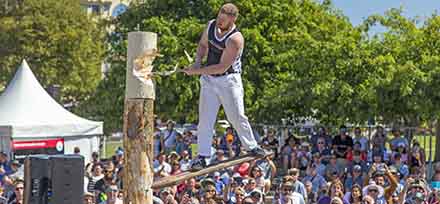Forget the politics, forget the grandstanding. Everything that could be said about the Victorian Government’s shameful decision to shut down the sustainable and thriving native timber industry has probably been said.
We are yet to see the full financial impact on East Gippsland, Victoria and the nation as a whole in its entirety for some time. But we know it won’t be pretty.
The industry appears doomed, jobs will be lost, towns will be hit hard, hardwood and now it seems white paper will be imported instead of being produced nationally.
Sadly, chances are people in Melbourne will largely be ignorant of what is going on. Until now.
One of the most popular events at the Royal Melbourne Show – in fact many regional shows as well – for generations has been the woodchopping events. In many ways it is possibly the last visible connection which still exists between the timber industry and the general metropolitan public.
It now faces a grim future because of the Victorian Government’s native timber decision.
Log supply for the Victorian Axemen’s Council’s upcoming woodchopping events are in jeopardy despite a promise by the Bracks Labor government in Victoria which guaranteed woodchoppers would always have logs.
A court order limiting timber harvesting in areas managed by VicForests means the council does not have enough logs to supply Victoria’s woodchopping events.
Without hardwood logs, Victorian athletes will be unable to compete at this 140-year-old traditional sport.
The Nationals leader and Member for Murray Plains, Peter Walsh, said the woodchop was being sacrificed on the “altar of Andrews Labor Government indifference as it continues to fail Victoria’s native timer industry”.
Australia has a grand tradition in the sport. It’s an international sport and Australia has delivered world-champion axemen and women.
And it started in Tasmania.
According to author and former professional forester in various parts of eastern Australia over 33 years Robert Onfray Australia has a history of woodchopping and sawing competitions dating back to the nineteenth century.
He writes that it is commonly believed that the sport of woodchopping originated in 1870 when Tasmanian Joseph Smith challenged Victorian Jack Biggs to cut a three-foot block for a wager of 15 pounds.
When Smith’s board began to sag, a gentleman moved in to take the weight on his shoulders, which gave victory to his champion. The report concludes with everyone celebrating with large pints of brown ale. A plaque in Ulverstone commemorates the event taking place in 1870. However, the wager took place in 1876. After the 1876 wager, Joseph Smith’s son donated a handsome trophy to remember his father’s event and achievement.
The potential loss of the sport is collateral damage certainly but damage all the same.
Damaging for the sport and damaging for the history of the timber industry in this country. Just another kick in the teeth really.
Will the general show-going public be upset if the woodchopping event is no more? Possibly.
Will they really know, or be told, why? Probably not.






